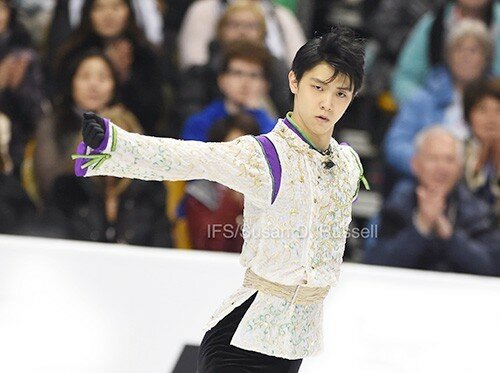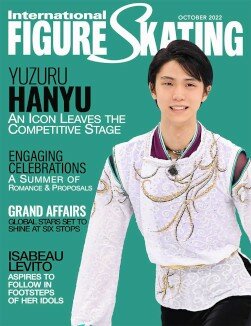

Two weeks, six world records. Yuzuru Hanyu shook up the skating world like no other had done before with his back-to-back performances in Japan and Spain at the end of 2015.
His record-breaking scores at both competitions have put him in a league of his own, and set the bar so high it would be a tough challenge for any other man to catch him or defeat him in Boston.
Yuzuru Hanyu’s Grand Prix season opener, Skate Canada, did not get off to a stellar start. His performance in the short took the world by surprise and was memorable for where he placed in the segment. After doubling a planned quad toe and repeating the jump on the back end of a combination, both of which received no points, the reigning Olympic champion landed in sixth place. No one was more surprised than Hanyu. It had been five years since he had placed that low in any segment at an international event.
He fought back in the long program to place second overall but it seemed an inauspicious start to the new season. However, his coach, Brian Orser, remained positive. “His first major competition of the year is never that great. It is a way to test the waters.” Orser could not have been more on the mark.
A month later at NHK Trophy, Hanyu took skating to new heights with his short program performance set to Chopin’s “Ballade No. 1.” He opened the routine with two quads, the second in combination, which earned high grades of execution and in less than a minute had racked up 28.67 points. Every other element of the routine, other than one spin, earned high levels. When his marks came up, there was an audible gasp in the arena. Hanyu’s score of 106.33 points surpassed his previous best of 101.45, which he achieved at the 2014 Olympic Winter Games. “The score doesn’t matter. I’m just happy to finally skate a clean short program to this music,” Hanyu said. “I practiced very, very hard, and I’m glad about the result. Like in the Olympic season, I could so very well in the short program, so I’d like to be relaxed and do my best in the long program.”
The skating world was still buzzing about his performance the following day when Hanyu took to the ice for the free. He had blown away the competition in the short, but that was just the beginning. The final competitor in the field, Hanyu laid down a jaw-dropping performance to “Seimei,” the soundtrack from the Japanese movie “Onmyoji.” His technical prowess was on full display that night — not missing a beat as he landed two individual quads and a third in combination — along with six other triple jumps; and his presentation of the program was superior to anything he had done before.
Sitting in the kiss and cry, Hanyu covered his face with his hands in disbelief as the scores flashed overhead — and then pretended to fall off the chair. Orser was amused by his student’s antics but was visibly moved by his student’s performance. “No words” was all Orser could say. Hanyu’s performance that night put him into another stratosphere. He became the first man to crack the 200 mark, with a free skate score of 216.07, and his record-breaking combined total of 322.40 cleared the 300-barrier for the first time.
In just seven minutes, Hanyu had ushered in a new era in men’s skating. “What was important was to carry out each element carefully and with quality,” said Hanyu, who admitted to being nervous before the competition. “I heard the cheers from the audience, and I could feel that everybody in Japan and the world encouraged me.”
His score did not surprise Orser. “I remember talking to someone, who said that his short program could be 105 to106 points, and that to me seemed to be the limit,” Orser said. “So when that happened, I was not surprised. I knew it would be over 100. What was more important to me was that we finally got to see how the program was designed. We had been waiting for it to mature, and it finally did in Japan.”
Legendary coach Tatiana Tarasova, who was commentating for a Russian television network was impressed. “Oh, well done! What a blessing it is to be able to see this! This is men’s singles skating,” she told her viewers. “He has grown a lot in a way. He is very slim, but his body has changed little; it has become stronger. Before, he had an amazing talent that enabled him to do everything, but he lacked strength.”
REIGNING IN SPAIN
Following his performances at NHK Trophy, some wondered whether Hanyu had hit his peak. Others opined that it might be impossible for him to achieve those scores again. Hanyu proved them all wrong. He was not done. He had saved the best for last. His short program performance at the 2015 Grand Prix Final in Barcelona was a step above the one in Nagano, and, before the final note had died, the entire audience was on its feet. For the second time in as many weeks, he had surpassed his own record score, this time earning 110.95 points.
“I’m surprised about the score, too. There was pressure to skate better than I did at NHK Trophy, but I was able to control it. In a different environment, I got the result I wanted,” said Hanyu, who turned 21 on December 7. “I was very nervous and spent most of the 30 seconds I had before I started trying to relax. The key things were the same, but this is not Japan; it is an unfamiliar place. There were a lot of fans from Japan, but also a lot of international fans, so I can take away that I did a good performance in unfamiliar surroundings in a different country.” His only lament was not earning top levels for his step sequence.
Expectations were even greater when Hanyu hit the ice for the long program. At the end of his program, as he took his final bow, there was no doubt that his execution of the program, the jumping passes and the spins had surpassed his previous best. When his marks were announced, a shock wave rippled through the global skating fraternity. Another record score — 219.48 points for the free — and an overall total of 330.43 put him far out of reach of any other skater on the planet. Hanyu was awarded 24 perfect 10s for his program components in both segments in Barcelona.
“At NHK Trophy I was simply able to celebrate what I had done, but this time it was more relief — the relief you feel after you’ve finished a tough competition,” Hanyu said. “I am really happy to have set a World record, but competing is about mastering your performance — how to master each element and the presentation. What is important is to show that. I always want to perform my best and be number one. All I need to do is skate like I know I can now, but, to be honest, I am surprised at how well I did under the pressure.”
His friend and training partner, Javier Fernández, who ranked second, said that it is always tricky to skate after Hanyu. “There is always so much stuff on the ice. And he always skates really well, and people are amazed,” Fernández said. “Skating after Yuzu — it doesn’t matter what I do, I’m not going to get higher than his score.”
STRATEGIC MOVES
Orser, who has coached Hanyu at the Toronto Cricket Club since April 2012, knew that his student had the potential to achieve record-breaking scores this season. “Yuzu was better trained, and, I think, physiologically, his body has changed a little bit for the better. He has also become much stronger,” he said. “Before Skate Canada, Yuzu and I were kind of butting heads a little bit about the order of elements and other things. And then, at Skate Canada, we had a meeting about how things needed to work going forward. I really had to put my foot down and get some things changed, things that I had been pushing for. Everyone listened, and we all worked together to make these changes. We also made some changes in his training and made it a little more intense. It just forced him to get back on track. Sometimes you have these humbling experiences that whip you in shape.”
Though there were only 10 days between NHK and the Final, Orser believed that Hanyu could improve on the scores he earned in Japan. “It was important for us to leave NHK behind and move forward, and, as exciting as it was, we did. I think that is why he was able to do what he did again — and even better than the first time. After he finished his free skate in Barcelona, I knew that he would earn a higher score than the one he achieved in Japan. He was so emotional when the marks came up. He just started crying and said to me, ‘I don’t know why I am crying.’ He just had one of those moments. He was overwhelmed — it was pretty overwhelming for everyone. We did not say anything; it was just an emotional moment.”
PROGRAM DESIGN
Hanyu turned once again to Canada’s Shae-Lynn Bourne to choreograph his free program for this season. She had been looking for something fresh and new for him, but when they met to discuss a new program he already had a piece of music in mind. “Music is always the key. Yuzuru had seen the movie ‘Onmyoji’ in Japan, and he loved the soundtrack. I immediately loved the music, but, even more so, I loved that he loved it,” Bourne recalled with a laugh. “I watched the movie and studied the movements, the nuances and the feeling before we started putting the program together. We talked a lot about what the music meant, but he already had a feeling for it.
“We worked together for five days, and it flowed so well from day one. Everything happened very naturally, and, because we had worked together before, we had a better connection, which helped me to bring out more of his personality in this program. At times we had a translator because, when you have a story and you want to go into detail, you don’t want any of the emotion and feeling to get lost. But Yuzuru pretty much understood everything I said. We were in agreement about almost everything about the story he would be telling, and he was very open about what was comfortable for him and what was not. We had laughs; we had tired moments. We had everything. It was really an enjoyable experience.”
Bourne did not go to Barcelona for the Final but watched his performances online. “It was incredible when he smashed those records,” she said. “I wish I could have seen it in person. It is never the same when you watch a performance on TV or on your iPad. Something always gets lost. From the moment he stepped onto the ice at the Final until the marks came up in the kiss and cry, it was thrilling. It was so satisfying, and I felt so proud of him. I did not even feel nervous watching him because he looked confident and sure. It is something he will be forever remembered for.”
Bourne knows the stress of competing at a high level and said that the better you are, the harder it is. “We put this pressure on ourselves, and the more difficult the programs are, the more stress there is,” she explained. “But Yuzuru did not appear nervous. He was not rushing the elements. He looked solid. I had spoken to a Japanese reporter after NHK who asked if I thought Yuzuru could do what he did in Nagano again. My thoughts were that once you get the taste of being in the present and feel how enjoyable it is, you cannot let go of it. So I said that, yes, I think he would be able to do it again because he got a taste of it, and why would you ever let go of it? That’s my thought.
“Yuzuru has a very strong core and a unique focus that he taps into. That was clear when I worked with him. No matter how much you train, it is more mental when you compete. What is going on in your head is going to play a big part in what you actually do. I think, because he loves the music that he skates to, he taps into it, and that makes it easier for him to relax, focus and be in the present. Each event that you improve adds to your confidence and to understanding yourself better. The sky is the limit for Yuzuru. He is certainly capable of achieving more.”
Orser agreed. “For sure, I think he can beat those records, but now we will likely just chip away at them by much smaller margins,” he said. “He was amazing that night, but we know where we can get more marks. When he adds a quad loop into the long program, there will be a lot of points right there. He can earn a couple of higher levels for the spins and the step sequence. The spins are fine, but he got Level 3′s on the step sequence in Japan and Spain, so there is a little bit here and there. The neat thing about this judging system is that the top skaters can challenge themselves to break their own records. He smashed the long program record the first time, and then he did it again by eight more points.
“I think Yuzuru is the Torvill and Dean of men’s skating.”




